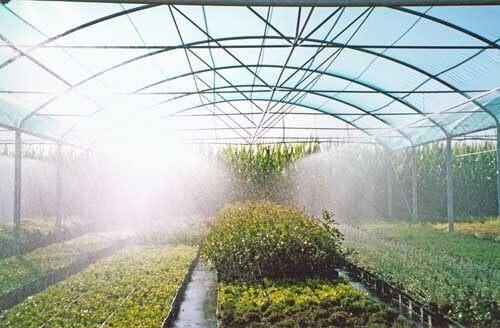

— Blogs —
—Products—
 Consumer hotline +8618073152920
Consumer hotline +8618073152920 WhatsApp:+8615367865107
Address:Room 102, District D, Houhu Industrial Park, Yuelu District, Changsha City, Hunan Province, China
Product knowledge
Time:2023-02-09 20:03:06 Popularity:626
Modern water-saving and efficient irrigation
With the growth of economy and population, water resources are becoming more and more a hot issue of concern. Therefore, the exploration of water-saving irrigation system has become the focus of many experts to study irrigation. Irrigation system includes the number of irrigation, irrigation quota (i.e. the amount of irrigation each time) and irrigation interval.
In general, irrigation systems can be divided into two categories: adequate irrigation systems and non-adequate irrigation systems. The traditional irrigation theory is based on adequate irrigation, that is, irrigation when the soil moisture reaches or near the lower limit of soil water content, so that it reaches the soil field water holding rate and does not produce deep seepage within the root system activity layer, that is, stop irrigation.

For this reason, each irrigation should meet the traditional irrigation requirements of "timely and sufficient". For a long time, irrigation systems have been designed according to the conditions of adequate irrigation, resulting in a large amount of inter-tree evaporation and deep seepage, and also greatly increasing the amount of water transpired by the crop.
Therefore, to save irrigation water, it is necessary to break through the traditional theory of adequate irrigation and explore the water saving potential under non-adequate irrigation conditions. To develop a reasonable irrigation system, we must first fully understand the water requirements of the crop at different stages of growth or development, and then fully combine it with the actual climate, actual environmental conditions and soil conditions to develop an irrigation system that is appropriate for the time and place.

Water-saving irrigation system is based on the crop in different stages of growth and development of water consumption rules and suitable water indicators, make full use of natural precipitation and soil storage capacity, under the premise of ensuring the normal physiological needs of the crop, to ensure that the crop water supply during the critical period of water demand, reduce the number of irrigation, inhibit the ineffective consumption of water in the field, so that the limited water resources to obtain higher yields, improve the efficiency of the use of water in the field and unit The benefits of water consumption.
The irrigation system of underground drip irrigation is generally based on the measured or calculated evaporation, soil and crop characteristics. If the irrigation time is determined according to the crop water consumption rate, the irrigation should be done in a small fixed amount of multiple irrigation; when irrigation is considered only when the soil moisture drops to some lower limit, water supply is needed once in several days.
Prev:Greenhouse irrigation and fertilization technology
Next:Analysis of the application of agricultural IoT in modern agriculture
Related recommendations
Sensors & Weather Stations Catalog
Agriculture Sensors and Weather Stations Catalog-NiuBoL.pdf
Weather Stations Catalog-NiuBoL.pdf
Related products
 Combined air temperature and relative humidity sensor
Combined air temperature and relative humidity sensor Soil Moisture Temperature sensor for irrigation
Soil Moisture Temperature sensor for irrigation Soil pH sensor RS485 soil Testing instrument soil ph meter for agriculture
Soil pH sensor RS485 soil Testing instrument soil ph meter for agriculture Wind Speed sensor Output Modbus/RS485/Analog/0-5V/4-20mA
Wind Speed sensor Output Modbus/RS485/Analog/0-5V/4-20mA Tipping bucket rain gauge for weather monitoring auto rainfall sensor RS485/Outdoor/stainless steel
Tipping bucket rain gauge for weather monitoring auto rainfall sensor RS485/Outdoor/stainless steel Pyranometer Solar Radiation Sensor 4-20mA/RS485
Pyranometer Solar Radiation Sensor 4-20mA/RS485
Screenshot, WhatsApp to identify the QR code
WhatsApp number:+8615367865107
(Click on WhatsApp to copy and add friends)